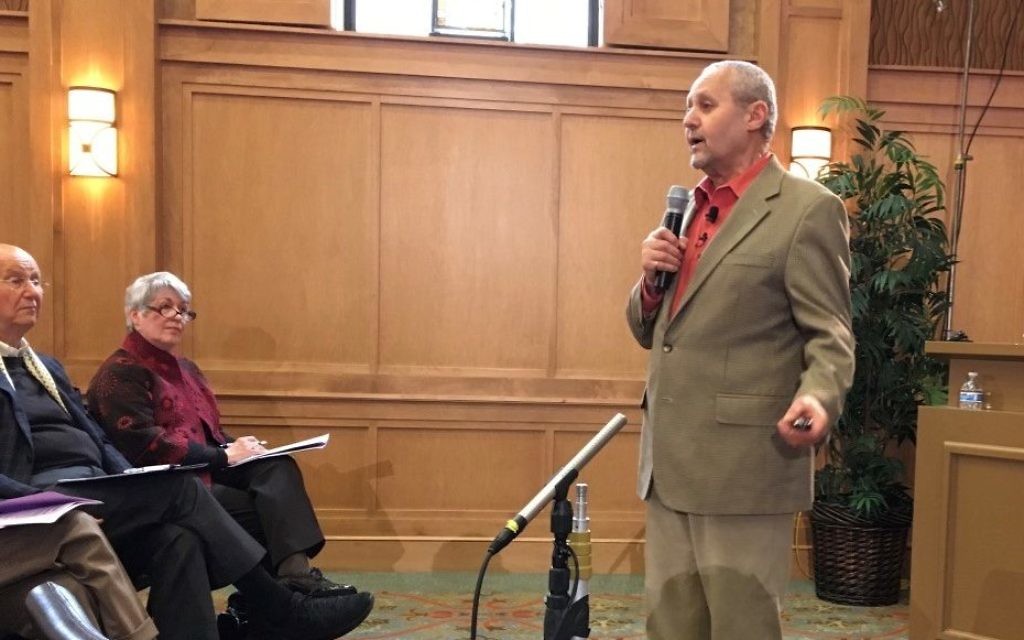Individual Engagement Brings Hope to Dementia
Jewish Home Life Communities is instituting the successful I'm Still Here program.

“Hope” and “dementia” are rarely used together, but memory care expert and Hearthstone Institute co-founder and CEO John Zeisel has shown it is possible.
In an April 8 presentation at the William Breman Jewish Home, “Hopeful Aging: Creating a Life of Purpose and Joy for Those With Dementia,” Zeisel explained his life-changing research and the work of his institute. Zeisel is also the author of “I’m Still Here: A New Philosophy of Alzheimer’s Care.”
Jewish Home Life Communities has partnered with Hearthstone and adopted that philosophy within its system of eight services and care communities on three campuses, ranging from walk-in clinic and at-home private care, to independent and assisted living, to memory care, nursing home and hospice, JHLC CEO Harley Tabak said.
Get The AJT Newsletter by email and never miss our top stories Free Sign Up
Tabak welcomed a crowd of around 175 to hear Zeisel at the ninth London Family AgeSmart Lecture. He said the series fulfills part of the nonprofit’s mission, to be a resource to the community on aging issues.
The JHLC board, chaired by Deborah Maslia, recently adopted a bold strategic plan. By working with Hearthstone, Tabak said, “we have enhanced our own care across the entire system over the last year.”
He said JHLC is the only senior care organization in Georgia to have two I’m Still Here dementia centers of excellence, at the Cohen Home and Berman Commons, and the Breman Home is near certification as well.
According to the Hearthstone website, I’m Still Here is based on the belief that “every person living with dementia is truly still there and can experience a high quality of life regardless of the severity of their memory loss.”

Tabak thanked Candy and Steve Berman, whose generosity made it possible to bring the program to JHLC.
To drive home the increasing importance of elder engagement and care, Steve Berman offered these statistics:
- Average life expectancy for a person born in 1900 was 42.
- In 2000, it was 82.
- Average life expectancy for a person born in 2030 is expected to be 100.
- By 2100, it is expected to be 130 years.
Candy Berman told of the impact Zeisel’s I’m Still Here method is having in improving the engagement and subsequent happiness and well-being of Berman Commons residents living with dementia.
“It begins with hope,” Zeisel said. “Hope is something that is not often spoken about when we talk about dementia.”
He said that there are so many negatives associated with dementia that “hope is out the window.”

He spoke about the burden, burnout and hardships when a person tries to care for a loved one with dementia, and he said every survey internationally shows that more people are afraid of dementia than of cancer.
Turning the bleak outlook to the positives of his Hope Method for dementia care, Zeisel said, “The goal is to give people their own sense of selves back, their own story.”
Through engagement with I’m Still Here, Zeisel showed examples of people “waking up and taking over and running things and teaching other people.”
At its heart, the model trains the caregiver, through curiosity, creativity, patience, persistence and kindness, to truly get to know each senior. — learning likes and dislikes, background, and preferences to involve each person in areas of personal interest.
“The secret to this I’m Still Here approach,” Zeisel said, “is engagement.”
Listing anxiety, agitation, aggression and apathy as “the four A’s,” or states that society considers to be a part of dementia, Zeisel said, “Engagement replaces those.”
Does a senior light up when hearing Frank Sinatra, or love to garden? Did a person serve our country or work as a teacher? Is there a special skill that can be used or taught to others? If so, the senior is empowered to listen, reminisce, experience or lead.
Residents are given choices that recognize their autonomy and help provide dignity and self-esteem. Do they like scrambled eggs or fried? Would they prefer the blue shirt or the plaid one? Even a person who always picks scrambled eggs is given the chance to choose.
When the caregiver taps into the essence of a resident that is still here, at a time that could be frightening and frustrating or overwhelming and demeaning, Zeisel’s method proves it is possible to achieve cognitive improvement and fulfillment. The hallmark anger, fear and withdrawal give way to hope.
While the approach cannot change the reality of a diagnosis of dementia, it can encourage the recognition and appreciation of a loved one’s present abilities instead of a retreat into despair. It creates an awareness of what is still there and of activities and accomplishments that are still possible.
Zeisel showed that, with engagement, people with dementia can learn, focus, regain a sense of identity, make decisions and experience joy. He told of the Learning for Life program being developed at JHLC, which is giving residents purpose and meaning. For example, through interaction and discussion, the residents as a group decide on and implement activities from beginning to end.
Zeisel closed with data gathered in response to a request from Tabak. Among other benchmarks, the use of I’m Still Here in the centers of excellence produced a higher quality of life and lower anxiety, positive affect, higher engagement, a reduction in dementia and stigma, and even fewer falls per resident.
Whether through music, group classes or field trips, “there’s absolutely no limit to the way we can engage people,” Zeisel said. “It takes a lot of work to do it, but it’s worth it. … Our job is to make a difference in their lives.”




comments